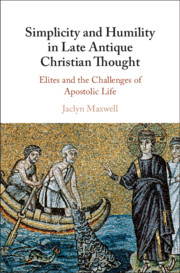 Simplicity and Humility in Late Antique Christian Thought
Simplicity and Humility in Late Antique Christian Thought Book contents
- Simplicity and Humility in Late Antique Christian Thought
- Simplicity and Humility in Late Antique Christian Thought
- Copyright page
- Dedication
- Contents
- Acknowledgments
- Abbreviations
- Introduction
- Chapter 1 Roman and Early Christian Attitudes toward Social and Economic Divisions
- Chapter 2 Christian Attitudes toward Social and Economic Divisions in Late Antiquity
- Chapter 3 Tentmakers and Fishermen
- Chapter 4 Apostolic Simplicity and Elite Education in Late Antique Theological Controversies
- Chapter 5 The Virtue of Humility in Late Antiquity
- Conclusions
- Bibliography
- Index
Conclusions
Published online by Cambridge University Press: 26 March 2021
- Simplicity and Humility in Late Antique Christian Thought
- Simplicity and Humility in Late Antique Christian Thought
- Copyright page
- Dedication
- Contents
- Acknowledgments
- Abbreviations
- Introduction
- Chapter 1 Roman and Early Christian Attitudes toward Social and Economic Divisions
- Chapter 2 Christian Attitudes toward Social and Economic Divisions in Late Antiquity
- Chapter 3 Tentmakers and Fishermen
- Chapter 4 Apostolic Simplicity and Elite Education in Late Antique Theological Controversies
- Chapter 5 The Virtue of Humility in Late Antiquity
- Conclusions
- Bibliography
- Index
Summary
When church leaders discussed the apostles and called attention to their low social standing, they were dealing with new ideas about equality and respect for lower-class people – new, that is, to Greek and Roman social thought. The social values and understanding of virtue based on biblical teachings meant that upper-class, educated Christian leaders sometimes promoted ideas that challenged their own claims to authority. In many cases, though, in addition to their development of new social ideas, we also see how upper-class Christian leaders in Late Antiquity tended to accommodate the bible’s most radical social critiques or proclamations (such as the call to renounce private property or to reject worldly wisdom) into something less threatening to existing social, economic, and cultural hierarchies. Instead of attempting to dismantle their own society, they could point to the emerging ascetic movement as the right way to enact the egalitarian ideals of the bible. The potential upheaval of honoring the lowly and asking the elite to renounce their power and prestige could instead be ordered within the confines of ascetic communities and overseen by church authorities. Asceticism made the new virtues of a simple life and a humble attitude more accessible to upper-class Christians and less threatening to social order.
- Type
- Chapter
- Information
- Simplicity and Humility in Late Antique Christian ThoughtElites and the Challenges of Apostolic Life, pp. 158 - 163Publisher: Cambridge University PressPrint publication year: 2021


